In This Issue
Compass Features
Job Opps
Update
CrimeStats
Between Issues
January at PENN
 |
Tuesday, December 16/23, 1997 Volume 44, Number 16 |
Dean of SAS: Dr. Preston of Sociology
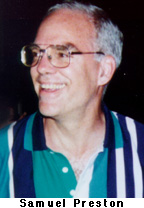 Dr. Samuel H. Preston, an internationally known
expert in population studies who has been on the faculty here for almost
20 years, has been chosen as Dean of the School of Arts and Sciences. He
is expected to take office January 12, succeeding Dr. Walter Wales, who
has served as interim dean since Dr. Rosemary Stevens returned to full-time
teaching and research in September 1996.
Dr. Samuel H. Preston, an internationally known
expert in population studies who has been on the faculty here for almost
20 years, has been chosen as Dean of the School of Arts and Sciences. He
is expected to take office January 12, succeeding Dr. Walter Wales, who
has served as interim dean since Dr. Rosemary Stevens returned to full-time
teaching and research in September 1996.
"Sam is the ideal person to lead SAS into the 21st Century," said President Rodin in announcing the selection. "We are extraordinarily lucky that, having scoured the nation to find a great new dean for SAS, the search committee ultimately located right here at Penn the best candidate I can imagine. I applaud the committee's efforts."
Dr. Preston, a native of Bucks County, took his baccalaureate degree magna cum laude at Amherst in 1965 and his Ph.D. in economics at Princeton in 1968. He then taught at Berkeley as assistant professor of demography until 1972, when he joined the sociology department of the University of Washington as associate professor and, at 28, director of the Center for Studies in Demography and Ecology. He became full professor two years later. In 1977 he accepted a two-year assignment as acting chief of the United Nations Population Trends and Structure Section.
Joining Penn as professor of sociology in 1979, he has served as director of the Population Studies Center here for most of the past 15 years, twice chaired the Department of Sociology and also served twice as chair of the Graduate Group in Demography. He is currently serving as Moderator of the University Councila role he will now yield.
Dr. Preston is a member of the the National Academy of Sciences and, since 1989, has served as chair of the its Committee on Population as well as its Social and Political Sciences Section. A winner of Guggenheim and Woodrow Wilson Fellowships, he is a Fellow of the American Academy of Arts and Sciences and of the American Association for the Advancement of Science and the American Statistical Association, among others. He has also been president of the Population Association of America, winning its 1983 Irene B. Taeuber Award for Excellence in Demographic Research; president of the Sociological Research Association; and member of the governing Council of the International Union for the Scientific Study of Population.
In twelve books and over 120 papers and reviews, Dr. Preston has published on a vast range of demographic topics, from historical overviews to fine-tuned investigations of differentials in mortality by race, education and other factors; the impact of population growth on economic and environmental processes; the consistency and accuracy of vital statistics; and many other subjects both here and abroad. He constructed the public use samples of the U.S. censuses of 1900 and 1910, and is highly regarded throughout the field for his development of mathematical and statistical tools for demographic analysis. He is also well known for his studies in the mid-eighties of changes in the the relative well-being of children and the elderly in the U.S. Among his very numerous major grants is the just-renewed National Institute of Aging Merit Award for research on Racial and Ethnic Differences in Adult Mortality.
Until Dr. Preston takes office January 12, Dr. Rodin said, he and Interim Dean Walter Wales will work closely together on the transition. "We all owe an enormous debt of gratitude to Walter, who has kept the ship of SAS quite securely afloat during throughout the months of the search for a new dean. Walter is the definition of a University citizen; his value to Penn is immense, and his assistance to Sam in the weeks ahead will be a service to us all."
The Abramson Vision: Family-Centered Cancer Care and Research
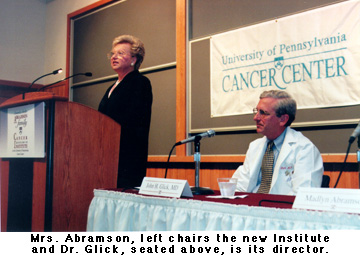 Last week at the School
of Medicine, Penn announced the creation of The Leonard and Madlyn Abramson
Family Cancer Research Institute at the University of Pennsylvania Cancer
Center--with a $100 million gift that is the largest single contribution
for cancer research to an NCI designated comprehensive cancer center.
Last week at the School
of Medicine, Penn announced the creation of The Leonard and Madlyn Abramson
Family Cancer Research Institute at the University of Pennsylvania Cancer
Center--with a $100 million gift that is the largest single contribution
for cancer research to an NCI designated comprehensive cancer center.
It is a gift that is unprecedented not only for its magnitude, but for its
intent. As the Philadelphia Inquirer put it, in a December 13 editorial
praising the couple's gift,
The Abramsons' $100 million gift to the University of Pennsylvania will go not for buildings, but to recruit talented scientists with a mandate to attack the five leading cancers: breast, lung, prostate, ovarian and gastrointestinal tumors.
The research is to be linked to medical education and personalized, compassionate care--a point stressed by Mrs. Abramson, who has battled breast cancer with the help of Penn doctors for a dozen years.
The Abramson Family Foundation is a trust fund
directed by the husband and wife team of Leonard and Madlyn Abramson. The
Abramsons have been supporters of cancer research, as well as numerous other
causes, for over a decade--endowing, among many other things, two professorships
and a multi-year grant to Penn's Bone Marrow Transplant Program. 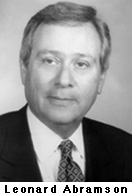 Mr. Abramson is the founder and former chairman and CEO
of U. S. Healthcare, Inc., which he built into one of the nation's largest
and most successful managed care organizations before selling it to Aetna
in 1996. Madlyn Abramson is a trustee of the University of Pennsylvania,
as well as a member of the Health System's Board of Trustees and the Graduate
School of Education's Board of Overseers.
Mr. Abramson is the founder and former chairman and CEO
of U. S. Healthcare, Inc., which he built into one of the nation's largest
and most successful managed care organizations before selling it to Aetna
in 1996. Madlyn Abramson is a trustee of the University of Pennsylvania,
as well as a member of the Health System's Board of Trustees and the Graduate
School of Education's Board of Overseers.
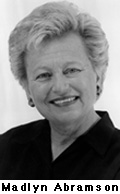 And, she is now chair of the board of the new
Abramson Cancer Center Research Institute. Its director is Dr. John H. Glick,
the Leonard and Madlyn Abramson Professor of Clinical Oncology who has directed
the Penn Cancer Center for more than a decade--and Mrs. Abramson's physician.
She spoke freely of that first-hand experience at the press conference and
in an advance release announcing the gift.
And, she is now chair of the board of the new
Abramson Cancer Center Research Institute. Its director is Dr. John H. Glick,
the Leonard and Madlyn Abramson Professor of Clinical Oncology who has directed
the Penn Cancer Center for more than a decade--and Mrs. Abramson's physician.
She spoke freely of that first-hand experience at the press conference and
in an advance release announcing the gift.
"Leonard and I are committed to supporting ground-breaking research that has the potential to reduce or eliminate the physical and psychological impact of cancer on patients and their families," said Mrs. Abramson. "We believe passionately that patient care can best be improved through a clearer understanding of the underlying causes of cancer; hence, our support of promising investigations by Abramson researchers. The University of Pennsylvania Cancer Center was chosen by our family because of its demonstrated excellence in both research and clinical care, as well as our shared vision for the future.
"The Abramson Institute's research findings will serve as the foundation for delivering the best possible care to patients--from disease prevention to diagnosis and treatment," she added. "As a cancer survivor for 12 years, I understand the importance of patient centered approaches in research and clinical activities. To that end, personalized and compassionate care will be the goal of all Abramson Institute efforts."
Trustees Chairman Roy Vagelos, himself a research scientist, spoke of his special appreciation for what the Abramsons are doing: "It takes courage and initiative to make things happen, and the Abramsons have plenty of both."
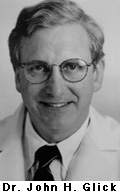 After outlining in detail the approach the Center
will take to to take state-of-the-art clinical programs and service excellence
to a new levels, Dr. Glick said, "Our goal is to treat every patient
as if they were a member of our own family in an environment where compassion
and caring are emphasized and parallel the developmetn of new technologies
and innovative treatments. There is no longer any wquestion about whether
we can and will cure cancer. The question now is, `When?' "
After outlining in detail the approach the Center
will take to to take state-of-the-art clinical programs and service excellence
to a new levels, Dr. Glick said, "Our goal is to treat every patient
as if they were a member of our own family in an environment where compassion
and caring are emphasized and parallel the developmetn of new technologies
and innovative treatments. There is no longer any wquestion about whether
we can and will cure cancer. The question now is, `When?' "
"This altruistic gift is a testament to Leonard and Madlyn Abramson's extraordinary philanthropic vision and their personal dedication to help all members of the cancer community,"said President Judith Rodin. "It will significantly increase opportunities to break new ground in the war on cancer--especially in the areas of cancer genetics and molecular diagnosis, from which future research and patient care advances will occur. All inroads we make will benefit cancer patients today--and tomorrow."
The Institute is set up to enhance and further--but not duplicate--current Cancer Center research and treatment programs. It will support leading-edge cancer research through the recruitment of outstanding scientists and physicians from around the world and the design of innovative patient care paradigms. And, the Abramson gift propels the University of Pennsylvania Cancer Center--already one of the nation's top cancer centers--to the next level of research and patient-focused care.
The gift, said Medical School Dean William N. Kelley, CEO of Penn's Health System "transforms Penn's Cancer Center."